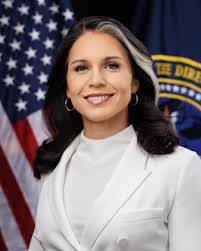
Introduction
Tulsi Gabbard, a former U.S. Representative and one of the first female combat veterans in the military, has made significant waves in American politics. Her diverse background, comprising themes of service, environmental issues, and foreign policy, continues to resonate with many voters. As the political landscape shifts, Gabbard’s unique perspectives and decisions are increasingly relevant, sparking discussions about the future direction of American governance.
Political Background and Policies
Gabbard, who served as a Democratic congresswoman from Hawaii’s 2nd congressional district from 2013 to 2021, has a record of supporting progressive policies. During her time in Congress, she focused on various issues including healthcare reform, climate change, and military intervention. Known for her anti-war stance, Gabbard has been vocal against U.S. involvement in foreign conflicts. This position distinguishes her from many of her Democratic peers and has garnered both praise and criticism from differing factions within the party.
2020 Presidential Campaign
Gabbard became a national figure during her 2020 presidential campaign, where she positioned herself as a candidate advocating for peace and unity. Using her military background, she appealed to voters seeking a change from traditional political narratives. Her unique approach included participating in debates where she challenged the political establishment, emphasizing the need to prioritize the well-being of American citizens over foreign exploits.
Current Developments
As of late 2023, Gabbard is continuing to influence the Republican party discourse, having left the Democratic party in 2022, citing ideological disparities. Her insights and critiques of mainstream narratives have attracted attention from a wide array of media platforms and public discussions. She continues to engage with constituents through social media and public speaking, advocating for issues such as civil liberties and individual rights.
Conclusion
Tulsi Gabbard remains a significant figure in contemporary American politics. As political dynamics evolve, her perspective on national and international issues may offer alternative pathways and provoke critical conversations among voters. Observing Gabbard’s trajectory will be crucial for understanding the emerging narratives within both the Democratic and Republican parties. Her ability to bridge gaps or draw divides will likely shape her influence in the years to come, making her a pivotal figure to watch in the political arena.



